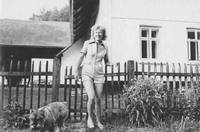Olga Havlova
(Born 11.7.1933, Prague, died 27.1.1996, Prague)
The president’s first wife
The first wife of President Václav Havel, Olga Havlová, nee Šplíchalová, was born in Prague on 11 July 1933. She grew up in the city’s working class Žižkov district. After elementary school she did an apprenticeship at a Baťa factory, where she later worked. During the 1950s she had a series of jobs, including as an accountant and sales assistant. In 1961–1969 she was an usher at the theatre Divadlo Na zábradlí, where Václav Havel was also working at the time.
She first met Václav Havel in 1956 and married him eight years later, in 1964. From then on Olga Havlová was with her husband, including through the most testing periods of his life. Václav Havel later spoke of her as an indispensable support. Following the quelling of the Prague Spring with the invasion of Czechoslovakia by Warsaw Pact troops she stood up alongside her husband against the political repression of Communist normalisation, actions that culminated with the publication of Charter 77 in January 1977.
Charity work
At the start of 1990 Olga Havlová founded the Committee of Good Will, in the tradition of the Committee for the Defence of the Unjustly Prosecuted, with friends from Charter 77. In 1992 she established the Olga Havlová Foundation and members of the Committee of Good Will joined its board of trustees, which she chaired. The main aim of the Committee of Good Will – Olga Havlová Foundation is to foster the social inclusion of the disabled and those who have been abandoned or suffered discrimination.
On the fifth anniversary of the Committee of Good Will, she decided that the Committee of Good Will – Olga Havlová Foundation would present the Olga Havlová Prize every year to disabled persons who have done a great deal to ameliorate the situation of the handicapped. As with the organisation’s other work, the award was intended to boost awareness of such people, recognition of their special needs and their social integration.
Prizes and honours
She received the Czech Literary Fund award for 1989 for dramaturgy and production on the Original Video Journal. She was named Woman of the Year 1991 in Norway for her charity work with the Committee of Good Will, while in 1995 she got the children’s prize “baroness from the land of all times” in the Netherlands for her work with children. In 1997 she received the Order of Tomáš Garrigue Masaryk in memorium for her outstanding service to democracy and human rights.








